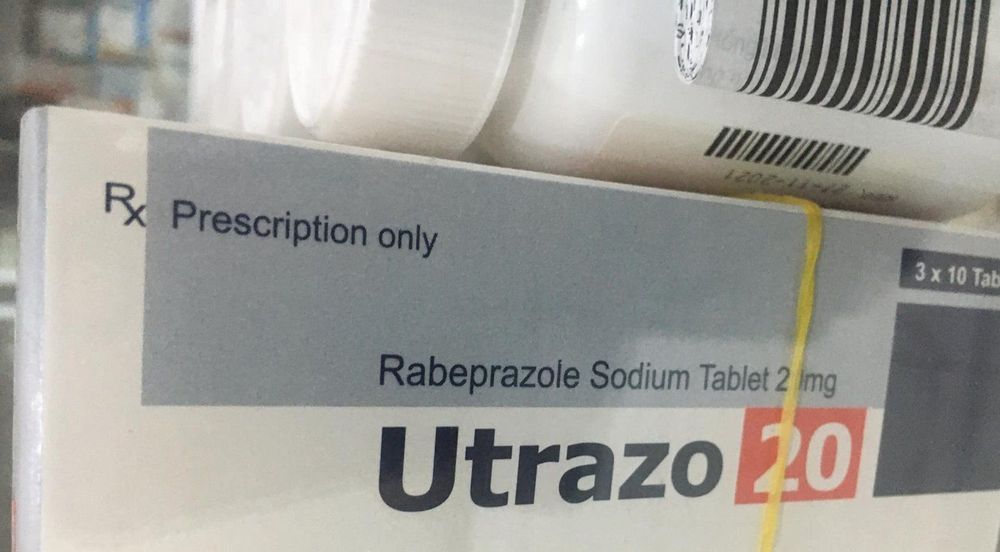This is an automatically translated article.
Utrazo 20 drug contains rabeprazole 20mg content. Utrazo is used to treat the symptoms of gastroesophageal reflux disease (GERD), allowing acid damage to the esophagus to heal and preventing further damage. In addition, Utrazo 20 is also used to treat Zollinger-Ellison syndrome, ulcers in the lining of the stomach or intestines, as well as in combination with other medicines to eradicate H. pylori.
1. What is Utrazo 20 and its uses?
Utrazo 20 drug contains rabeprazole 20mg, belongs to a group of drugs called Proton pump inhibitors. Rabeprazole works by reducing the amount of acid produced by the stomach. Accordingly, the use of Utrazo drug is used to treat:
Duodenal ulcer and benign gastric ulcer Gastroesophageal reflux disease (GERD) with or without ulcers. People with GERD often have heartburn, a burning sensation, and a feeling of tension from the stomach or lower chest toward the neck. Zollinger-Ellison syndrome is a condition when the stomach produces extremely large amounts of acid. Combination with two antibiotics (clarithromycin and amoxicillin) is used to rule out H. pylori infection in patients with peptic ulcer disease.

Thuốc Utrazo 20 có thành phần là rabeprazole với hàm lượng 20mg
2. Things to know before taking Utrazo 20
Do not take rabeprazole or Utrazo 20 if you have one of the following conditions:
Are allergic (hypersensitive) to rabeprazole sodium or any other ingredient in the medicine You are pregnant or think you are pregnant . Breastfeeding person. In addition, you need to talk to your doctor or pharmacist before taking Utrazo 20 if:
Are allergic to other proton pump inhibitors Have a stomach tumor. Have or are having any liver problems. Are taking a medicine called atazanavir (used to treat HIV). Reduced body stores or risk factors for low vitamin B12 Have ever had a skin reaction after treatment with a medicine similar to Rabeprazole that reduces stomach acid. If you develop a skin rash, especially on sun-exposed areas, tell your doctor right away as treatment with rabeprazole may need to be stopped. Taking a proton pump inhibitor such as rabeprazole, especially for a period of more than one year, may slightly increase the risk of fracture of the hip, wrist, or spine. Therefore, it is important to let your doctor know if you have a history of osteoporosis or if you are taking corticosteroids at the same time as this can increase the risk of osteoporosis.
3. How to use Utrazo 20?
Patients need to take Utrazo 20 exactly as prescribed by the doctor or pharmacist. Only remove the medicine from the blister when it is time to take it. Then, swallow the tablet whole with a glass of water without chewing or crushing the tablet.
The doctor will specify how many tablets to take and how long to take them. This will depend on the individual case. As Utrazo 20 only needs to be taken once per day, the tablet should be taken in the morning before breakfast.
For adults, the dosage for each disease is as follows:
Duodenal ulcer and benign gastric ulcer: The dose is 20mg, taken once a day in the morning. Most patients with duodenal ulcers are treated for four to six weeks. However, some patients may require additional treatment time to achieve effective ulcer healing on the gastrointestinal mucosa. Gastroesophageal reflux disease (GERD) with ulcers: Dosage is 20mg, taken once daily for four to eight weeks. Long-term treatment of GERD: 10mg or 20mg once daily. Zollinger-Ellison syndrome: The dose is 60mg once daily at the start of treatment. The dose is then adjusted by the doctor depending on the response to the medication. H. pylori eradication: Dosage is 20mg twice daily and is normal for 7 days with a combination of two antibiotics - clarithromycin and amoxicillin). For children, Rabeprazole tablets are not recommended for use in these populations.
If you accidentally take more rabeprazole tablets than prescribed, you should consult your doctor or go straight to the hospital. Conversely, if you forget to take your medicine, take it as soon as you remember. However, if it is almost time for your next dose, skip the missed dose and continue as usual without taking a double dose to make up for a missed dose.

Loét tá tràng và loét dạ dày lành tính là công dụng thuốc Utrazo 20
4. Possible side effects when taking Utrazo 20
Like all medicines, Utrazo 20 can cause side effects, although not everyone gets them. Usually, side effects are mild and improve on their own without stopping the medication. However, if you notice any of the following serious conditions, you need to stop taking the medicine and contact your doctor immediately, as urgent medical treatment may be needed:
Allergic reaction - signs Signs may include facial swelling, difficulty breathing, or a drop in blood pressure that can cause fainting or falling. Frequent infections, such as sore throat or fever, sores in the mouth or throat. Easy bruising or bleeding. In addition, the common side effects of Utrazo 20 include:
Cough, sore throat due to sore throat), runny nose Effects on the stomach or intestines, such as stomach pain, diarrhea, flatulence, cold feel nauseous, vomiting or constipated Fatigue, backache Fatigue, loss of strength, flu-like symptoms Difficulty sleeping, headache, dizziness Benign polyp in stomach. In summary, the drug Utrazo 20 contains rabeprazole, which reduces the amount of acid in the stomach. Accordingly, the use of Utrazo drug is widely used to treat heartburn, acid reflux and gastroesophageal reflux disease (GERD). In addition, rabeprazole is also used to prevent and treat stomach ulcers or Zollinger-Ellison syndromes. Utrazo 20 belongs to the group that inhibits acid secretion, so it is best taken before breakfast. Patients need to eat in moderation, avoid skipping meals and reduce stress in life to create the best conditions for the lesions on the gastrointestinal mucosa to heal faster.
Follow Vinmec International General Hospital website to get more health, nutrition and beauty information to protect the health of yourself and your loved ones in your family.
Please dial HOTLINE for more information or register for an appointment HERE. Download MyVinmec app to make appointments faster and to manage your bookings easily.
References: medicines.org.uk,hpra.ie













